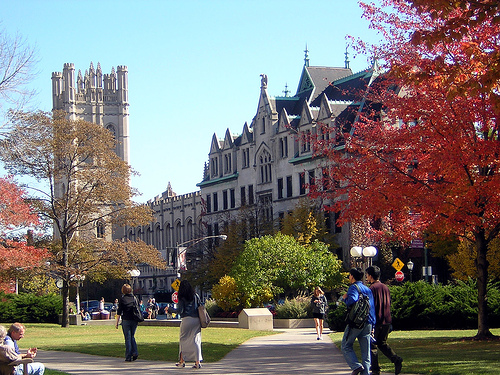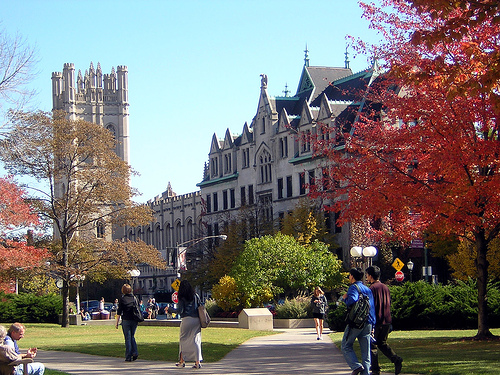
Mortadelo2005
The OECD defines the middle class as households with incomes ranging from 75 to 200% of the median income in a country. In the US, a bachelor must earn $ 23,400–62,400 per year to be in the middle class.
At the peak in 1985, the total income of the middle class in developed countries was 4 times higher than that of the richest people, and now it is less than 3 times, according to OECD data. In subsequent decades, it has been growing much slower than the value of real estate, education, health care, many goods and services. A fifth of middle-class households spend more than they earn, according to the OECD. Because of this, they are much more likely to go into debt, compared to rich or poor people.
Those people who are traditionally considered the basis of society and the economy have to take more loans. This is why they consider their position less stable, and chances of the younger generation to become middle class have decreased. 70% of baby boomers (the post-war generation) aged between 20 and 30 years belonged to the middle class, but there are only 60% of middle-class citizens among the millennials (1980–2000 of birth).
Housing is an extremely acute issue. According to the OECD estimates, payments for real estate accounted for approximately 25% of the expenses of the middle class in 1995. Now it takes one third of incomes. “Today, the middle class increasingly resembles a boat in the middle of a storm,” says OECD Secretary General Angel Gurria. For example, rental housing in Berlin has risen in price by 70% since 2012, and by 43% - in Munich, while real incomes of ordinary employees in Germany grew only by 8.4%.
In the mid-1980s, a middle class family had to save money for just six years to buy an apartment of 60 sq.m. in the capital of their country. Now, however, they would need 10 years.
At that, it is becoming increasingly difficult to achieve the status of the middle class. Now, it is necessary that both spouses work and at least one of them is highly qualified, OECD experts say. In the mid-1980s, it was enough for a family to have one highly qualified employee. And now every sixth representative of the middle class risks losing their jobs due to automation. “The current generation is one of the most educated, but they are less likely to achieve the same standard of living that their parents had,” said Head of the OECD secretariat Gabriela Ramos.
There is a clear link between middle class sustainability and economic growth, according to the OECD. The experts explain this by intolerant attitude of the middle class towards corruption and beliefs in democratic institutions. Their problems could lead to political instability that could hinder investment and economic growth, the organization warned.
To stop this trend, the OECD recommends reducing taxes for the middle class and raising them for the rich, as well as taking measures to slow down the rise in prices for real estate, education and health care. The problem is so urgent that millionaires and billionaires paid attention to it. Jamie Dimon, CEO of JPMorgan Chase, the largest US bank, noted in a letter to shareholders that the American dream has faded for many. He urged to reform the mortgage market, take measures to reduce the rapidly growing costs of health care, to change the policy in the field of education, immigration, infrastructure, regulation, taxes, the labor market, budgeting and planning.
The current wave of populism in many developed countries is a protest of people against the establishment, which is explained by the feeling that their situation is not improving, and opportunities are declining, according to Fuller Treacy Money. Until 2008, the politicians' responded to dissatisfaction with money. Now, there is no such possibility, and many indebted consumers, having suffered from the crisis, have reduced loans.
source: oecd.org
At the peak in 1985, the total income of the middle class in developed countries was 4 times higher than that of the richest people, and now it is less than 3 times, according to OECD data. In subsequent decades, it has been growing much slower than the value of real estate, education, health care, many goods and services. A fifth of middle-class households spend more than they earn, according to the OECD. Because of this, they are much more likely to go into debt, compared to rich or poor people.
Those people who are traditionally considered the basis of society and the economy have to take more loans. This is why they consider their position less stable, and chances of the younger generation to become middle class have decreased. 70% of baby boomers (the post-war generation) aged between 20 and 30 years belonged to the middle class, but there are only 60% of middle-class citizens among the millennials (1980–2000 of birth).
Housing is an extremely acute issue. According to the OECD estimates, payments for real estate accounted for approximately 25% of the expenses of the middle class in 1995. Now it takes one third of incomes. “Today, the middle class increasingly resembles a boat in the middle of a storm,” says OECD Secretary General Angel Gurria. For example, rental housing in Berlin has risen in price by 70% since 2012, and by 43% - in Munich, while real incomes of ordinary employees in Germany grew only by 8.4%.
In the mid-1980s, a middle class family had to save money for just six years to buy an apartment of 60 sq.m. in the capital of their country. Now, however, they would need 10 years.
At that, it is becoming increasingly difficult to achieve the status of the middle class. Now, it is necessary that both spouses work and at least one of them is highly qualified, OECD experts say. In the mid-1980s, it was enough for a family to have one highly qualified employee. And now every sixth representative of the middle class risks losing their jobs due to automation. “The current generation is one of the most educated, but they are less likely to achieve the same standard of living that their parents had,” said Head of the OECD secretariat Gabriela Ramos.
There is a clear link between middle class sustainability and economic growth, according to the OECD. The experts explain this by intolerant attitude of the middle class towards corruption and beliefs in democratic institutions. Their problems could lead to political instability that could hinder investment and economic growth, the organization warned.
To stop this trend, the OECD recommends reducing taxes for the middle class and raising them for the rich, as well as taking measures to slow down the rise in prices for real estate, education and health care. The problem is so urgent that millionaires and billionaires paid attention to it. Jamie Dimon, CEO of JPMorgan Chase, the largest US bank, noted in a letter to shareholders that the American dream has faded for many. He urged to reform the mortgage market, take measures to reduce the rapidly growing costs of health care, to change the policy in the field of education, immigration, infrastructure, regulation, taxes, the labor market, budgeting and planning.
The current wave of populism in many developed countries is a protest of people against the establishment, which is explained by the feeling that their situation is not improving, and opportunities are declining, according to Fuller Treacy Money. Until 2008, the politicians' responded to dissatisfaction with money. Now, there is no such possibility, and many indebted consumers, having suffered from the crisis, have reduced loans.
source: oecd.org


















